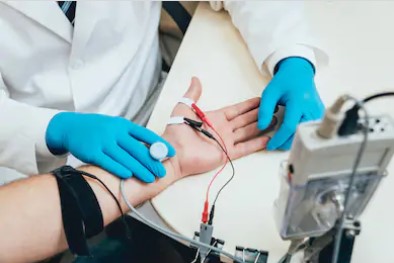Nerve Conduction Velocity (NCV), Nerve Conduction Studies

Nerve Conduction Velocity (NCV), Nerve Conduction Studies
What is nerve conduction velocity?
Nerve conduction velocity (NCV) test is a measurement of the speed of conduction of an electrical impulse through a nerve. NCV can determine nerve damage and destruction.
During the test, the nerve is stimulated, usually with surface electrode patches attached to the skin. Two electrodes are placed on the skin over the nerve. One electrode stimulates the nerve with a very mild electrical impulse and the other electrode records it. The resulting electrical activity is recorded by another electrode. This is repeated for each nerve being tested.
The nerve conduction velocity (speed) is then calculated by measuring the distance between electrodes and the time it takes for electrical impulses to travel between electrodes.
A related procedure that may be performed is electromyography (EMG). An EMG measures the electrical activity in muscles and is often performed at the same time as NCV. Both procedures help to detect the presence, location, and extent of diseases that damage the nerves and muscles. Please see this procedure for additional information.
Vivacare public information from The National Institute of Neurological Disorders and Stroke
Last updated January 24, 2008
This information is for general educational uses only. It may not apply to you and your specific medical needs. This information should not be used in place of a visit, call, consultation with or the advice of your physician or health care professional. Communicate promptly with your physician or other health care professional with any health-related questions or concerns.
Be sure to follow specific instructions given to you by your physician or health care professional.
